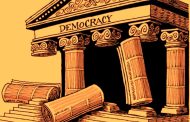President Muhammadu Buhari is heading to Ethiopia where, among other engagements, he will be speaking at the 35th Ordinary Session of Assembly of the African Union Heads of State and Government. Is it likely that his intervention will be a fire-spitting, repeat performance of the Murtala Mohammed’s ‘Africa Has Come of Age’ style speech some 46 years ago? Six years down the line that he has been president of Nigeria the second time, Buhari has not made a speech that defended any doctrines or concepts unique to him. Is he doing that now?

The late Gen. Murtala Mohammed
Although the issues are very different, the months are the same and it is a Nigerian leader on the world stage from a continental signature event: a regular gathering of the African Union. With Murtala, it was the question of deconstructing the power play on the national liberation crisis in Southern Africa then, particularly Angola. Now, the issue is “Building Resilience in Nutrition and Food Security on the African Continent: Strengthen Agriculture, Accelerate the Human Capital, Social and Economic Development’’
Notwithstanding the prescriptiveness of the title, building resilience in nutrition and food security in Africa is also about power. Who gets so much to eat and who doesn’t is a question of power, just like who is free and who is not.
Resilience which is almost displacing the concept of security in International Relations is a no less contested field. While neoliberals parade it as the answer to the uncertainties and complex spaces of insecurity in the 21st century, its critics say it is a neoliberal attempt to shift the burden of safety provision from big capitalists to the poor by making everyone responsible for his or her own safety. A major component of resilience is anticipatory practices of safety, especially in the face of unimaginable security threats like 9/11. Nobody imagined that anybody would grab planes and weaponise them. But it happened. Resilience argues the possibility of anticipating such threats and overcoming them by acquiring the survival tips corresponding to such eventualities.

President Cyril Ramaphosa of South Africa
Is a key African leader going to say, hey, this is great, let’s groom our people to colonise the future in food security or he is going to give it a counter-neoliberal discursive punch in the face? Can any African country actually get its people to internalise safety measures as to bounce back in nutritional terms when most of them cannot guarantee clean drinking water, operate without electricity and basic technology? This are some of the question being pondered upon in foreign policy circles as the Nigerian leader heads for Africa’s diplomatic capital.
While the Murtala regime had the advantage of hard headed intellectuals as well as radical civil servants, this does not seem to be the case with the Buhari regime although it is possible there are some egg heads operating in the corridors of power. Prof Ibrahim Gambari, the Chief of Staff to the president, is a veteran of foreign policy maneuvers. The fear in some circles is whether his vast experience is not a hindrance in terms of the possibility of the Murtala type of speech in 1976 said to have been initially drafter by the trio of the late Ambassador Olu Adeniji who himself later became Nigeria’s Minister for Foreign Affairs; Dr. Bala Usman, the late Ahmadu Bello University, Zaria Historian; Dr. Patrick Wilmot who was then teaching Political Sociology also at the same university before he was deported by the Babangida regime and cleansed up by Ambassador Muhammad Sanusi, the Permanent Secretary for the Ministry of what was then known as the Ministry of External Affairs before it became known of the Ministry of Foreign Affairs.
Every sentence in the speech rings an anti-imperialist tone but the paragraph that has been most quoted is where Murtala said “Mr. Chairman, when I contemplate the evils of apartheid, my heart bleeds and I am sure the heart of every true blooded African bleeds. When we talk of these evils we are assured of the ‘sympathy’ of the Western countries, but when we call for sanctions to end this shame of Western civilisation, suddenly the glitter of gold in the form of high dividends becomes more convincing a consideration than the lives, the liberty and the well-being of Africans”
That Gen Murtala was killed a few weeks after the speech must have instructed his successors to behave themselves but voices of rebellion are still heard among African leaders. President Cyril Ramaphosa of South Africa has been blasting unequal power relations at the global level. Paul Kagame of Rwanda never tires in sending verbal missiles in the direction of global powers regarding the ‘African condition’ although ex-British Prime Minister, Tony Blair, is believed in informed circles to be his unpaid adviser.
Thabo Mbeki, Former president of South Africa can be very vicious in taking Africa’s development partners up for hypocrisy but he is usually so sophisticated in framing his attacks that it is rarely Murtalaseque. The question is where Buhari prefers to be!




























